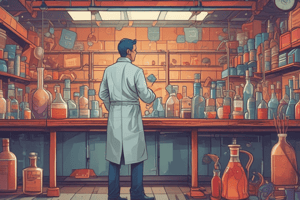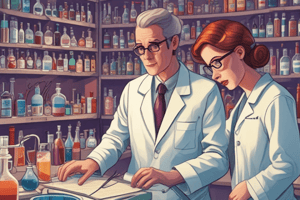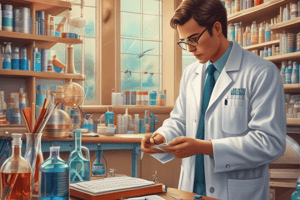Podcast
Questions and Answers
What is the origin of the word 'clinical'?
What is the origin of the word 'clinical'?
- From the Latin word 'clinis' meaning science
- From the Greek word 'kline' meaning bed (correct)
- From the Greek word 'kemos' meaning chemical
- From the French word 'clinique' meaning hospital
What is the primary purpose of clinical chemistry?
What is the primary purpose of clinical chemistry?
- To study the levels of various body constituents during health and disease (correct)
- To develop new medicines
- To treat diseases
- To perform surgical procedures
What type of specimens are typically analyzed in clinical chemistry?
What type of specimens are typically analyzed in clinical chemistry?
- Only saliva samples
- Blood samples, urine, and other body fluids (correct)
- Only blood samples
- Only tissue specimens
What is the role of clinical chemistry in medicine?
What is the role of clinical chemistry in medicine?
What is clinical chemistry as a service?
What is clinical chemistry as a service?
What is the link between clinical chemistry and other sciences?
What is the link between clinical chemistry and other sciences?
What is a primary source of errors during the preexamination stage of laboratory testing?
What is a primary source of errors during the preexamination stage of laboratory testing?
What is a critical responsibility of phlebotomists during the preexamination stage?
What is a critical responsibility of phlebotomists during the preexamination stage?
Which of the following patient-related factors can affect the quality of a blood sample?
Which of the following patient-related factors can affect the quality of a blood sample?
What type of variables can affect normal values for test results?
What type of variables can affect normal values for test results?
Who is primarily responsible for controlling errors during the preexamination stage?
Who is primarily responsible for controlling errors during the preexamination stage?
Why is it important for phlebotomists to be aware of patient conditions and complications during blood collection?
Why is it important for phlebotomists to be aware of patient conditions and complications during blood collection?
What happens to the volume ratio of plasma to red blood cells when the serum or plasma is removed from the tube?
What happens to the volume ratio of plasma to red blood cells when the serum or plasma is removed from the tube?
What can cause substances to be centrifuged into the serum or plasma, altering test results?
What can cause substances to be centrifuged into the serum or plasma, altering test results?
What is the purpose of a test requisition form?
What is the purpose of a test requisition form?
Why should a phlebotomist not collect a sample without a requisition form?
Why should a phlebotomist not collect a sample without a requisition form?
How may a healthcare provider request a lab test?
How may a healthcare provider request a lab test?
What happens to the requisition form after it is generated by the healthcare provider?
What happens to the requisition form after it is generated by the healthcare provider?
What is the primary use of a Thyroid Panel in clinical chemistry?
What is the primary use of a Thyroid Panel in clinical chemistry?
What is the purpose of a Cardiac Panel in clinical chemistry?
What is the purpose of a Cardiac Panel in clinical chemistry?
What is a common reason for specimen rejection in clinical chemistry?
What is a common reason for specimen rejection in clinical chemistry?
What is the importance of transporting samples to the laboratory?
What is the importance of transporting samples to the laboratory?
What is included in a Lipid Profile?
What is included in a Lipid Profile?
What is the purpose of measuring Non-Protein Nitrogenous Compounds in clinical chemistry?
What is the purpose of measuring Non-Protein Nitrogenous Compounds in clinical chemistry?
What type of tubes are used to collect serum for clinical chemistry tests?
What type of tubes are used to collect serum for clinical chemistry tests?
Why is it important to allow samples to clot fully before centrifugation?
Why is it important to allow samples to clot fully before centrifugation?
What is the primary purpose of using centrifugation in the laboratory?
What is the primary purpose of using centrifugation in the laboratory?
What is the relative centrifugal force (RCF) of a centrifuge dependent on?
What is the relative centrifugal force (RCF) of a centrifuge dependent on?
At what gravity (g) are most laboratory samples typically centrifuged?
At what gravity (g) are most laboratory samples typically centrifuged?
Why is it important to follow proper centrifugation procedures?
Why is it important to follow proper centrifugation procedures?
Flashcards are hidden until you start studying




